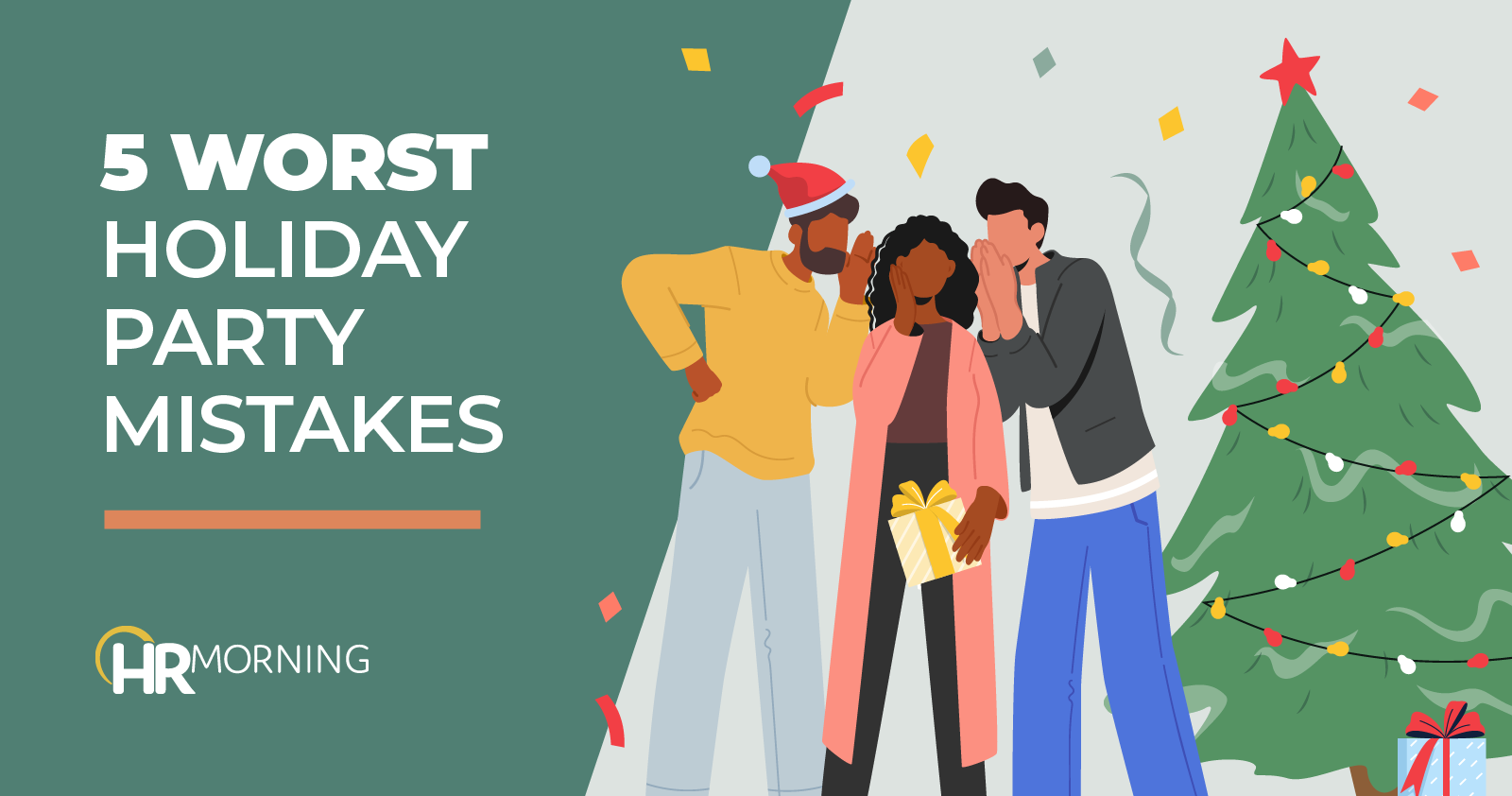‘Tis the season for office holiday parties.
It’s also the season for some employees to make jackasses of themselves at those holiday parties.
In HR, you don’t want that happening, of course.
Bad party behavior will most definitely lead to some embarrassment. But that’s the least of it: Bad party behavior can lead to lawsuits.
Employees may behave badly. But the company looks like the bad guy for hosting a party from a scene in the “Office Christmas Party.”
The drama is real: A third of employees have done things they’ve regretted at holiday office parties, according to a survey from OnePoll and Evite. And 40% of employees have watched the drama unfold.
So, let’s see the worst party behaviors — the things that usually lead to that regret.
Worst behaviors at holiday parties
We’ve looked at several studies to pull together this list, and one behavior rises to the top of every survey: drinking too much.
Here are all of them:
- Getting drunk. More than 60% of employees in an Instantprint study said they don’t like being around their overly intoxicated colleagues at office holiday parties.
- Hooking up. More than a third of employees in the Evite survey said they’ve witnessed co-workers hook up at their holiday parties. While most people see it happen, just 12% of employees admit they’ve made the holiday party mistake of flirting with, kissing or hooking up with a colleague, client or boss, according to a survey from Price4Limo.
- Gossiping. And once the drinking and flirting starts, the gossip follows. Employees will hear as many as seven pieces of gossip during a holiday party, the Evite survey found.
- Dancing. Not everyone is a bad dancer like “Seinfeld’s” Elaine Benes at her holiday party. But most people should leave their dancing shoes at home when the music starts. About 30% of the employees in the Price4Limo study said they’ve danced with colleagues, clients and/or the boss … and regretted it. And if you insist on dancing, keep your heels on: More than 20% of employees think it’s gross when their colleagues dance in bare feet, the Instaprint study found.
- Teambuilding and games. Most employees don’t want their holiday parties to include teambuilding activities and party games. They’d rather socialize informally, according to the Instaprint survey.
- Dressing inappropriately. People don’t want to see their colleagues in the clothes they wear to nightclubs. Nearly a quarter of employees in the Instaprint survey said they want to see a level of professionalism in their colleagues’ attire when they party together.
Host a better holiday party
You probably want to host a holiday party that doesn’t lead to the worst behaviors. More importantly, you want to have an inclusive celebration that recognizes and rewards employees for their efforts all year.
“The holidays are first and foremost about showing appreciation to your employees,” says Mark Wachen, CEO and Founder of CardSnacks. “You can use this time as an opportunity to reinforce company culture and show your recognition and appreciation for everyone on your team.”
To do that, here are five tips to keep holiday parties on the up-and-up:
- Make it optional. Whatever kind of celebration you choose, don’t force employees to attend.
- Exclude or limit alcohol. Try a holiday luncheon on-site, allowing employees to leave early afterward. If you host an after-hours party that includes alcohol, give tickets for a drink or two and limit the bar hours. Provide several non-alcoholic options.
- Be inclusive. Choose a generic holiday or winter theme with a variety of décor, games, food and drinks – or don’t theme your activities or food offerings at all.
- Be accommodating. Pick a venue that’s accessible to guests with physical or neurological differences. Make announcements and play music in languages other than English if employees use multiple languages.
- Follow work policies. Circulate workplace policies ahead of the event to remind employees that you expect that same proper conduct at a social event as you do on the job. That might include your company code of conduct, health and safety guidelines and policies around zero-tolerance, substance use, and social media use.


